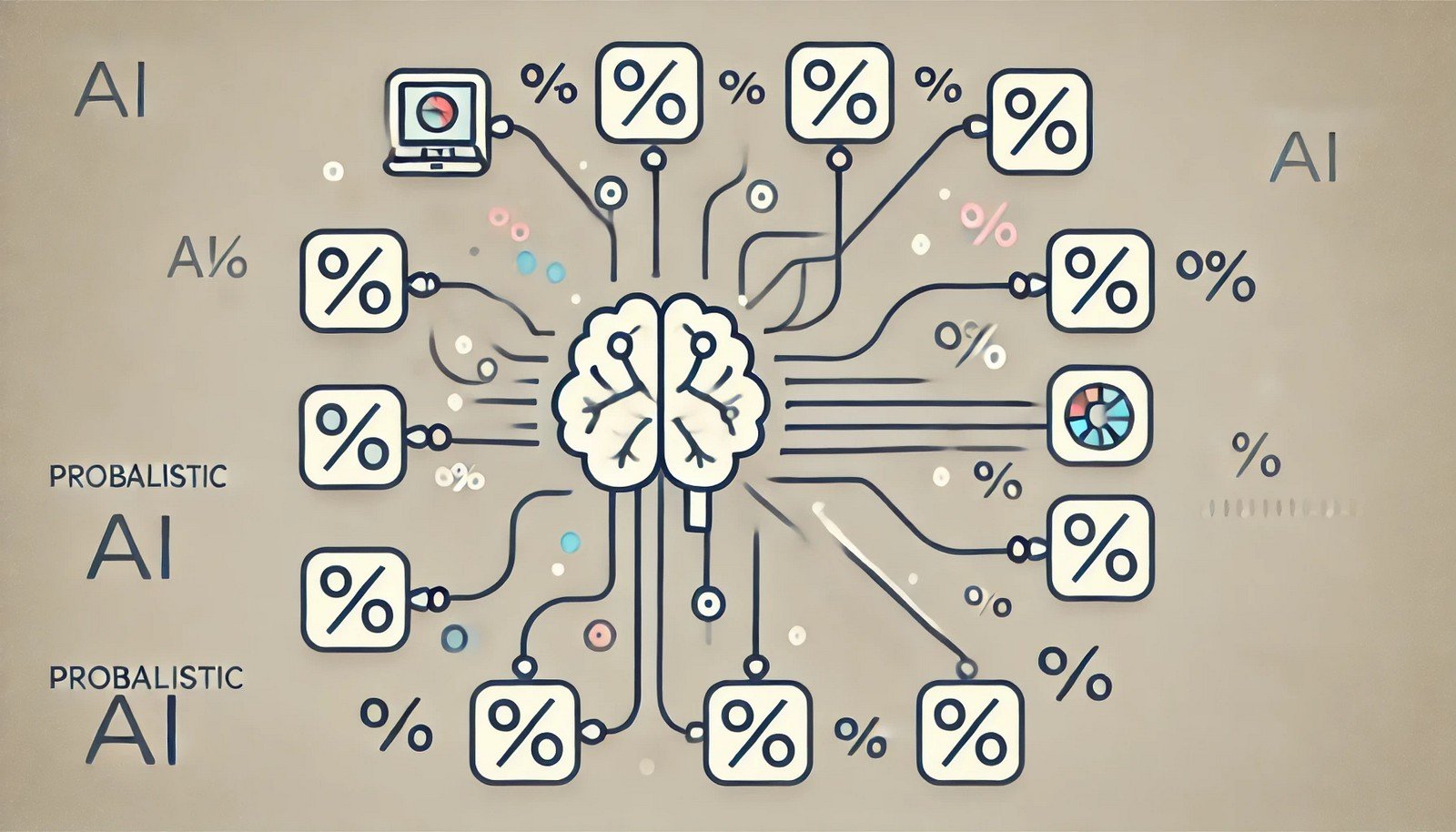Probabilistic AI

Quick Navigation:
- Probabilistic AI Definition
- Probabilistic AI Explained Easy
- Probabilistic AI Origin
- Probabilistic AI Etymology
- Probabilistic AI Usage Trends
- Probabilistic AI Usage
- Probabilistic AI Examples in Context
- Probabilistic AI FAQ
- Probabilistic AI Related Words
Probabilistic AI Definition
Probabilistic AI refers to artificial intelligence systems that make decisions and predictions based on probabilities rather than deterministic outcomes. It incorporates statistical methods and probabilistic models, like Bayesian networks, to assess the likelihood of different outcomes and improve decision-making under uncertainty. Probabilistic AI techniques are widely used in fields requiring predictive analytics, such as healthcare and finance, where precise outcomes are unpredictable, and approximations provide actionable insights. The core approach of Probabilistic AI is to compute possibilities rather than certainties, allowing for adaptive, nuanced, and often more accurate responses to complex, real-world situations.
Probabilistic AI Explained Easy
Imagine Probabilistic AI like a weather forecast. Instead of saying it "will" rain, it says there's a "60% chance" of rain. This means it doesn’t claim to know the future exactly, but it can guess based on past data and probabilities. Probabilistic AI uses these "chance" ideas to make predictions or decisions. Just like the forecast helps you decide if you should carry an umbrella, Probabilistic AI helps computers make smart guesses in uncertain situations.
Probabilistic AI Origin
The origins of Probabilistic AI lie in the fusion of statistics with computer science, an intersection that began evolving in the mid-20th century. Early statistical models were used in fields such as epidemiology and economics but gradually entered AI research as computer scientists realized the power of probability in handling uncertainties. Key figures in the development of probabilistic methods, such as Thomas Bayes and Andrey Kolmogorov, indirectly influenced this evolution. With the advent of machine learning, Probabilistic AI has become essential in applications requiring predictions, such as natural language processing and computer vision.
Probabilistic AI Etymology
The term "probabilistic" comes from the Latin word probabilis, meaning "likely" or "approvable." The usage reflects an approach that focuses on likelihoods rather than absolutes, suited for scenarios with unpredictable or uncertain elements.
Probabilistic AI Usage Trends
Probabilistic AI has seen growing adoption, especially in domains requiring nuanced decision-making under uncertainty, such as autonomous vehicles, predictive maintenance, and customer recommendation systems. Its trend follows the increase in big data availability, as probabilistic models need vast datasets for accurate predictions. The use of probabilistic approaches in deep learning models has further popularized it, especially in AI research, as it allows systems to better handle incomplete or noisy data.
Probabilistic AI Usage
- Formal/Technical Tagging: Bayesian inference, Stochastic modeling, Markov decision processes, Predictive analytics
- Typical Collocations: "Probabilistic reasoning," "Predictive modeling," "Bayesian networks," "Probability distributions," "Uncertainty estimation"
Probabilistic AI Examples in Context
In Healthcare: A probabilistic AI system might predict a patient's likelihood of developing a specific disease based on past medical records and genetic data, guiding doctors in proactive care.
In Finance: Financial analysts use probabilistic AI to forecast stock trends by estimating probabilities of market outcomes, factoring in economic data and historical trends.
In Autonomous Driving: Probabilistic AI helps self-driving cars anticipate the actions of other drivers by analyzing probabilities of movement in various traffic scenarios, enhancing safety.
Probabilistic AI FAQ
- What is Probabilistic AI?
Probabilistic AI refers to AI models that make predictions or decisions based on likelihoods or probabilities rather than certainties. - Why is Probabilistic AI important?
It allows AI systems to handle uncertainty and make informed decisions in unpredictable environments. - How does Probabilistic AI work?
It uses probability-based models to calculate the likelihood of various outcomes, providing a range of possible results. - Where is Probabilistic AI used?
It’s commonly used in healthcare, finance, autonomous systems, and any field requiring predictions with inherent uncertainties. - What are examples of probabilistic models?
Examples include Bayesian networks, Markov decision processes, and Monte Carlo simulations. - How is Probabilistic AI different from deterministic AI?
Probabilistic AI deals with probabilities and uncertainty, while deterministic AI follows set rules and provides exact answers. - Can Probabilistic AI make mistakes?
Yes, since it deals with probabilities, predictions might not always be accurate, but they give informed estimates. - Is Probabilistic AI used in machine learning?
Absolutely. Probabilistic models are foundational in many machine learning applications, particularly in supervised and unsupervised learning. - What is Bayesian inference in Probabilistic AI?
Bayesian inference is a method to update predictions or hypotheses as more data becomes available, commonly used in probabilistic AI. - How does Probabilistic AI handle uncertain data?
It assesses the probability of different interpretations or outcomes, allowing it to function effectively even with incomplete or noisy data.
Probabilistic AI Related Words
- Categories/Topics: Artificial Intelligence, Machine Learning, Statistical Modeling, Predictive Analytics
- Word Families: Probability, Bayesian, Stochastic, Inference, Estimation
Did you know?
Did you know that Netflix uses probabilistic AI to recommend shows? By analyzing your past viewing patterns and comparing them with data from similar viewers, Netflix estimates the probability that you’ll enjoy specific content, ensuring more personalized recommendations!
PicDictionary.com is an online dictionary in pictures. If you have questions or suggestions, please reach out to us on WhatsApp or Twitter.Authors | Arjun Vishnu | @ArjunAndVishnu

I am Vishnu. I like AI, Linux, Single Board Computers, and Cloud Computing. I create the web & video content, and I also write for popular websites.
My younger brother, Arjun handles image & video editing. Together, we run a YouTube Channel that's focused on reviewing gadgets and explaining technology.



Comments powered by CComment